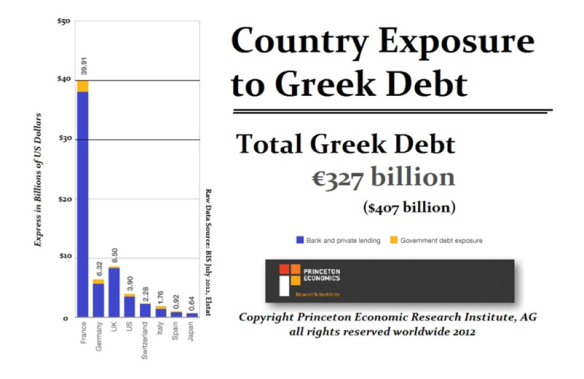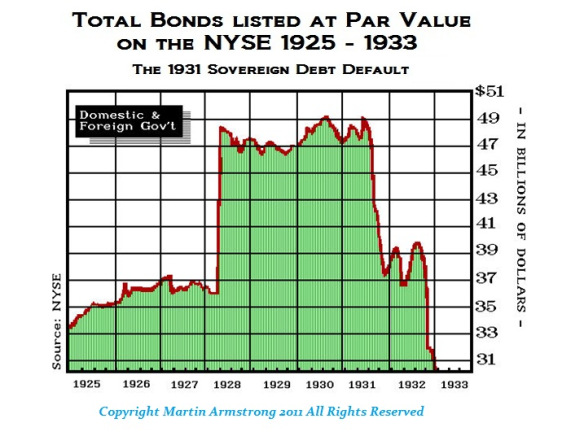
The Sovereign Debt Crisis is leading to authoritarian governments all over the world. Because government have to pay the bondholders and are scared to death of what happens if they cannot, we must lose all our liberties. It is not just the USA. It is everyone.
The Sovereign Debt Crisis is of profound importance. What is grossly being overlooked is both the exposure of banks to sovereign debt in Europe as well as Japan. In the case of the former, France is more or less ignoring the global trend and is putting peddle to the medal. As if they were driving straight off a cliff, they have simply sped up the process. On Wednesday the French government approved a measure that will lower the retirement age to 60 from 62 for a narrow group of workers, reversing the unpopular pension reforms made by former President Nicolas Sarkozy. They are also in Britain hunting down its citizens with new tax investigations. If the Greeks do not blow up the Euro, don’t worry, the French will.

The French banks are in serious shape and now the Government will not back off of its insane socialistic policies. Just where is this money supposed to come from nobody knows.
In Japan, the same problem exists. The Japanese debt is going to crash and burn in 2013. This will be the first opportunity for a major low in Japan. It will be 23 years down. Expect the JGBs to crash, the yen to decline, and the Nikkei to finally rally after it makes new record lows in 2013. The Japanese bank exposure to Japanese debt is monumental. The slightest uptick in interest rates in 2013 will wipe out bond investors like we saw in 1931. This will push the dollar higher as capital flees and parks in the dollar. Eventually that will flip and the dollar will drop with the Sovereign Debt Crisis eventually migrating to the USA.
As far as where to put your money, well that will be good solid equities. Gold of course will provide the underground economy. So those buying gold, make sure it is in coin form not in banks nor in bar form. Gold is not headed for nonsense of $30,000 and ounce. If that ever happened, the troops would be hunting down gold door to door in the USA.
The Sovereign Debt Crisis defines everything. Just remember what happened to bonds in 1931. Here is a vivid chart because this data is usually suppressed.

The government are all about self-interest. If you really think anything will change for the positive, think again.
About Martin Armstrong of Armstrong Economics
“Armstrong is the developer of the Armstrong Economic Confidence Model, best known for calling the crash of 1987 to the very day. The model pegged June 13-June 14, 2011 as the start of a long-term upward trend in the market; the market obliged by notching its first weekly rise since April 29.”. … Pi suggested some future turning points which Armstrong watched carefully as they approached. Among them was December, 1989, which marked the Nikkei’s peak before it crashed. This call earned him the New Yorker magazine’s Equity’s award as the top North American economist, and a big following in Japan, where the idea of cycles, a tenet of Eastern belief, did not seem so far-fetched. He presided over conferences in the ballroom of the Imperial Hotel in Tokyo and began investing billions of dollars on behalf of Japanese clients. He boasted that the Japanese called him Mr. Yen. Another big pi date was July 20, 1998, which turned out to mark the high point in the S. & P. just before a Russian default broke the giant hedge fund Long Term Capital Management and nearly wrecked the financial system. Armstrong by now was running a couple of hedge funds, and the Magnum Hedge Fund Reporter named him Fund Manager of the Year.
“In Armstrong’s view of the world where boom-bust cycles occur like clockwork every 8.6 years, what matters is his record as a forecaster. … He called Russia’s financial collapse in 1998, using a model that also pointed to a peak just before the Japanese stock market crashed in 1989. These days, as the European sovereign-debt crisis roils markets worldwide, he reminds readers of his October 1997 prediction that the creation of the euro “will merely transform currency speculation into bond speculation,” leading to the system’s eventual collapse.”












